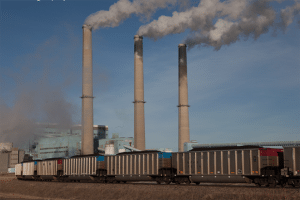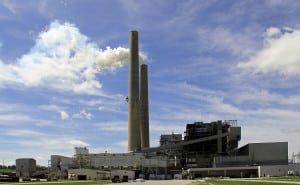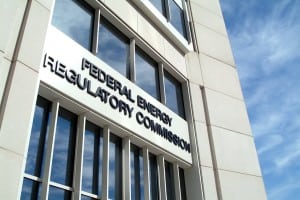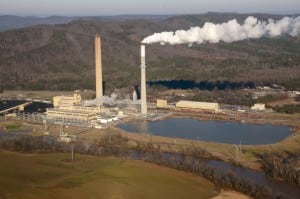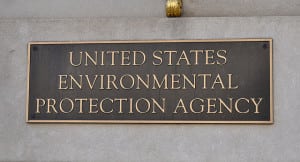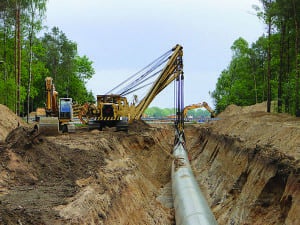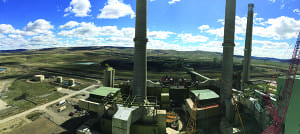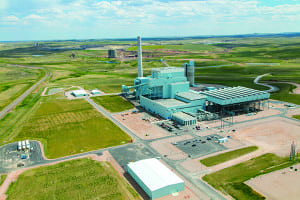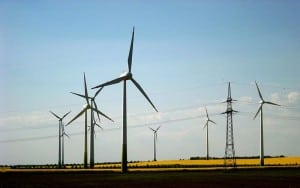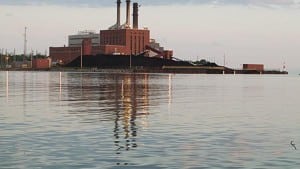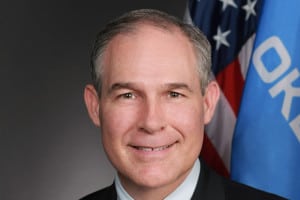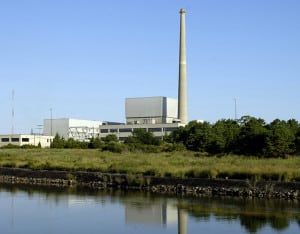Legal & Regulatory
-
Legal & Regulatory
A Brief History of the Clean Power Plan (VIDEO)
The Environmental Protection Agency (EPA) released a proposed rule to replace the Clean Power Plan—a rule regulating greenhouse gas emissions (GHG) from existing coal-fired power plants. The new “Affordable Clean Energy” rule sets GHG guidelines for states to set standards for performance for existing coal-fired power plants. The proposal is the newest development in a […]
-
Legal & Regulatory
Judge Rules New York Gas Plant Can Resume Startup Tests
A New York Supreme Court judge on August 15 said Competitive Power Ventures (CPV) can resume startup tests at its new natural gas-fired power plant in Wawayanda. The decision Wednesday from Judge Roger D. McDonough came one day after CPV sued New York’s Department of Environmental Conservation (DEC). CPV is seeking an injunction allowing it […]
-
Legal & Regulatory
States Would Set Rules Under Trump Emissions Plan
A report from POLITICO says the Trump administration’s rollback of the Obama-era Clean Power Plan (CPP) would give individual states more leeway to set their own rules governing emissions from power plants. POLITICO, which covers politics and policy both in the U.S. and internationally, said its review of a draft document, and information from a […]
-
Legal & Regulatory
Group: Indiana Should Reject Vectren Plan for New Gas-Fired Plant
An Indiana consumer protection agency has told state regulators they should reject Vectren Corp.’s plan to build a new natural gas-fired power plant in the state. Vectren wants the plant to replace four of the utility’s retiring coal-fired units. Indiana’s Office of Utility Consumer Counselor (OUCC) on August 13 said it completed a five-month legal […]
-
Legal & Regulatory
Official: FERC, Other Agencies Identifying ‘Critical’ Coal, Nuclear Plants
An official with the Federal Energy Regulatory Commission (FERC) told a nuclear industry group this week that the agency and Trump administration officials are trying to identify power plants they consider critical to the nation’s grid. The move is seen as part of the White House effort to prop up the struggling U.S. coal and […]
-
Legal & Regulatory
New York Denies Air Permit for New Gas-Fired Power Plant
A natural gas-fired power plant in New York state that planned to ramp up to full operations this month has been denied an air quality permit from state officials. Competitive Power Ventures’ (CPV’s) Valley Energy Center in Wawayanda, located in Orange County north of New York City, is in the final testing and commissioning phase, […]
-
Legal & Regulatory
An 865-MW Georgia Power Coal Plant Is Showing Distress
The future of Georgia Power’s 865-MW coal-fired Plant Hammond in Floyd County, Georgia—which recently slashed more than half its workforce—is murky, company officials said August 3. The four-unit facility that began operations in 1954 employed 190 workers in September 2016. Today, according to company officials, the plant only has 41 full-time employees. Georgia Power Regional […]
-
Legal & Regulatory
EPA Will Not Revisit Obama-Era NAAQS for Ozone
The Environmental Protection Agency (EPA) does not intend to revisit national ambient air quality standards (NAAQS) for ozone that the Obama administration issued in 2015, a court filing shows. The agency said in its final status report submitted to the U.S. Court of Appeals for the D.C. Circuit on August 1 that it has reviewed […]
-
Legal & Regulatory
Natural Gas: Clear Skies, Some Clouds on the Horizon
Horizontal drilling technology and fracking techniques have created a natural gas revolution in the U.S. The future looks bright for gas-fired power generation but there are three potential storm clouds that
-
Legal & Regulatory
Water Use Down Drastically at U.S. Power Plants
Water withdrawn by U.S. steam-driven power generators fell 18% in 2015 compared to 2010, owing largely to plant closures, coal-to-gas fuel switching, and the use of more water-efficient cooling system
-
Commentary
What is ‘Resilience’, and Do We Need It?
U.S. Secretary of Energy Rick Perry last year petitioned the Federal Energy Regulatory Commission (FERC) to craft policies to provide for “resilience” in the nation’s generation resource mix. He wrote
-
Legal & Regulatory
Extensive Planning, Innovative Work Strategies, Teamwork Combine for Successful SCR Project
A coal-fired plant in Colorado needed to further reduce its emissions to comply with more-stringent regulations. The work presented several challenges, and the owner and contractors worked together to complete
-
Legal & Regulatory
Dry Fork: A Model of Modern U.S. Coal Power
Dry Fork Station began commercial operation as a swath of older, less-efficient U.S. coal plants contemplated retirement amid a flood of environmental rules. Designed with foresight, this quintessential modern
-
Legal & Regulatory
Losing Regulatory Approval Gamble, AEP Scraps $4.5B Wind Project
American Electric Power (AEP) has abandoned its mammoth $4.5 billion Wind Catcher project, one of its largest planned investments, and a key part of its strategy to tamp down carbon emissions by 2030. Under AEP subsidiary Southwestern Electric Power Co. (SWEPCO)’s proposed Wind Catcher project, AEP would have acquired a 2-GW wind farm—under construction in […]
-
IIOT Power
DHS Warns that Russians Hacked Control Rooms
Department of Homeland Security (DHS) officials in a July 24 webinar said that Russian hackers infiltrated a power plant industrial control system (ICS) in an incident that could have caused a blackout last year. However, as an industrial cybersecurity expert pointed out—and a DHS spokesperson confirmed—the impact of the incident may be overstated. The expert and DHS responded to a […]
-
Legal & Regulatory
FERC Mandates Reporting of Attempted Cybersecurity Breaches
The Federal Energy Regulatory Commission (FERC) has ordered the North American Electric Reliability Corp. (NERC) to broaden, within six months, its Critical Infrastructure Protection (CIP) reliability standards to include mandatory reporting of cybersecurity incidents that could harm the bulk electric system (BES). FERC’s Order No. 848issued on July 19 directs NERC to develop and submit […]
-
Press Releases
TAE Technologies Welcomes Secretary of Energy Rick Perry on Tour of World’s Leading Private Fusion Energy Facility
TAE Technologies’ plasma performance is rapidly ramping up in Norman using advanced active feedback controls, further validating the company’s unique approach to fusion energy. FOOTHILL RANCH, CA, July 19, 2018 — Secretary Rick Perry today joined executives of TAE Technologies, Inc., the world’s largest and most advanced private fusion energy company, at its headquarters in […]
-
Legal & Regulatory
EPA Finalizes First Set of Coal Ash Rule Revisions
The Trump administration has finalized a significantly weakened rule governing the disposal of coal ash in landfills and surface impoundments by coal generators nationwide. The Environmental Protection Agency (EPA) revealed on July 18 that it signed the first rule of its two-part rulemaking set that overhauls the Obama administration’s final 2015 rules for the disposal […]
-
Legal & Regulatory
Records Analysis Complete at Le Creusot Forge, Nuclear Parts Production Ramped Up
Framatome reached a major milestone in its review of Le Creusot Forge’s manufacturing records, finishing the task of identifying and characterizing deviations in all of the records for forgings installed on nuclear reactors in France. A total of 1,925 records were analyzed. At this stage of the process, no serviceability issues have been identified in […]
-
Legal & Regulatory
NRG Ends Effort to Repower Dunkirk Plant
NRG Energy will not restart its Dunkirk power plant in western New York, with the company on July 11 saying the cost to reconnect the facility to the state’s electric grid prohibits reopening the retired coal-fired plant as a natural gas-fueled facility. David Gaier, an NRG spokesman, told POWER the project’s increased costs, along with needed […]
-
Legal & Regulatory
EPA Sends Replacement for Clean Power Plan to Trump
The Trump administration is moving forward with its effort to replace the Clean Power Plan, with the president set to review a document sent to the White House on July 9. The Environmental Protection Agency (EPA) on July 10 said a new rule, which insiders said would be more favorable to the coal industry, was […]
-
Legal & Regulatory
EPA Chief Pruitt Resigns; Former Coal Lobbyist Takes Helm
Scott Pruitt, chosen by President Donald Trump to lead the Environmental Protection Agency despite repeated lawsuits against the agency when he served as Oklahoma’s attorney general, resigned as EPA director July 5. Pruitt had been under scrutiny throughout his EPA tenure for questionable ethical decisions involving his office. Pruitt, who repeatedly said he had done […]
-
Legal & Regulatory
FERC Thwarts ISO-NE’s Attempt to Keep Mystic Gas Units Online
The Federal Energy Regulatory Commission (FERC) on July 2 denied ISO-New England’s (ISO-NE’s) request for a tariff waiver to keep two gas-fired units—a total capacity of 1,700 MW—at Exelon’s Mystic Generating Plant in Boston, Massachusetts, running to address “fuel security risks.” The commission instead gave the grid operator a year to submit permanent tariff revisions […]
-
Legal & Regulatory
FERC Nixes PJM’s Fixes for Capacity Market Besieged by Subsidized Resources
In a 3–2 decision, the Federal Energy Regulatory Commission (FERC) rejected approaches filed by PJM Interconnection to reform its capacity market, whose integrity and effectiveness has been increasingly and “untenably threatened” by state subsidies for preferred generation resources, the federal regulatory body acknowledged. The June 29 order sharply divided the commission, prompting Democrat Commissioners Cheryl LaFleur […]
-
Legal & Regulatory
Oyster Creek Will Close Sept. 17; Fuel Could Remain at Site for 60 Years
Officials with the U.S. Nuclear Regulatory Commission (NRC) on July 2 said Oyster Creek Nuclear Generating Station, the country’s oldest operating nuclear power plant, will officially close on September 17. They also said radioactive material is likely to remain at the site in New Jersey until at least the late 2070s, and perhaps beyond. The […]
-
Commentary
How Will Interstate Natural Gas Pipeline Certification Change?
The Federal Energy Regulatory Commission (FERC) on April 19 issued a Notice of Inquiry (NOI) to seek stakeholder input on how the agency should revise its 1999 Certificate Policy Statement regarding the review
-
Legal & Regulatory
Trump Administration’s ‘All-of-the-Above’ Strategy Stresses Export Role for Natural Gas
The Trump administration, which is considering subsidizing baseload coal and nuclear power for resiliency and “national security,” is pursuing an “all-of-the-above” energy strategy that emphasizes natural gas exports, said Energy Secretary Rick Perry at the World Gas Conference this week in Washington D.C. In a keynote speech on June 26, Perry described the shale gas […]
-
Commentary
Grid Reliability and Resilience Pricing: FERC’s Rulemaking and How Our Energy Markets Are Responding
Kenneth W. Irvin and Christopher Polito1 Sidley Austin LLP – Washington, D.C. What is “resilience,” and do we need it? As anyone who has not been on Mars knows, last year, U.S. Secretary of Energy Rick Perry petitioned the Federal Energy Regulatory Commission (FERC) to craft policies to provide for “resilience” in our generation resource […]
-
IIOT Aerospace
Bill Codifying Federal Role in ICS Cybersecurity Clears House
A bill codifying the Department of Homeland Security’s (DHS’s) role in addressing industrial control systems (ICS) cybersecurity has cleared the U.S. House of Representatives. While H.R. 5733, “DHS Industrial Control Systems Capabilities Enhancement Act,” contains no mandates for the private sector, it directs the DHS’s National Cybersecurity and Communications Integration Center (NCCIC) to develop and maintain […]
-
Legal & Regulatory
AEP’s $4.5B Wind Catcher Project Gets Louisiana’s Approval
American Electric Power’s (AEP’s) proposed $4.5 billion Wind Catcher Energy Connection project—the largest single-site wind project in the nation—has garnered approval from the Louisiana Public Service Commission (LPSC). The LPSC on June 20 approved a settlement agreement related to the project, which is proposed by AEP subsidiary Southwestern Electric Power Co. (SWEPCO). Under the proposal, […]



